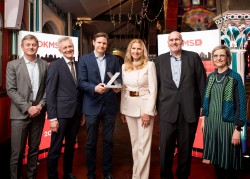Prof. Dr. Robert Zeiser (B09) receives the 2024 DKMS Mechthild Harf Science Award from the DKMS Stiftung Leben Spenden (Foundation for Giving Life) as honour for his outstanading research work in the field of allogeneic stem cell transplantation. With the DKMS Mechtild Harf Science Award, the foundation honours the lifetime achievements of internationally renowned physicians and scientists in the field of stem cell transplantation and cellular therapies.

v.l. Prof. Dr. Marcel van den Brink, Vorsitzender des Medizinischen Beirats der DKMS, Prof. Johannes Schetelig, Leiter DKMS Clinical Trials Unit, Preisträger Prof. Dr. Robert Zeiser, Dr. Elke Neujahr, Global CEO der DKMS, Dr. Dr. Alexander Schmidt, CMO der DKMS, Prof. Dr. Katharina Fleischhauer, Mitglied im Medizinischen Beirat der DKMS © Fraser Cameron
“Professor Robert Zeiser’s findings in basic research into graft-versus-host disease have led to new therapeutic approaches that are changing practice and significantly improving the outcome for patients following stem cell transplantation. The same applies to his studies on the control of disease relapse after transplantation,” said Prof Dr Katharina Fleischhauer, member of the DKMS Medical Advisory Board and Head of the Institute for Cell Therapeutic Research at Essen University Hospital, in recognition of the award winner. The Head of the Department of Tumour Immunology and Immune Regulation and the Zeiser Laboratory at the Department of Internal Medicine I at the University Medical Center Freiburg accepted the award on 15 April 2024 in the presence of medical professionals and guests from all over the world at the EBMT (European Society for Blood and Marrow Transplantation) annual conference in Glasgow.
“Zeiser is one of the most internationally renowned scientists in the field of allogeneic stem cell transplantation, who has decisively advanced our understanding of the mechanisms of graft-versus-host disease (GvHD),” said Fleischhauer at the presentation of the Mechtild Harf Science Award, which is endowed with 10,000 euros. “The new therapeutic principles developed on the basis of his findings in the treatment of this serious complication are a prime example of successful translation of basic research to the patient’s bedside.”
New therapy for the treatment of life-threatening immune reactions
For the majority of patients with acute leukaemia, an allogeneic blood stem cell transplant is the only chance of a cure. However, the therapy is associated with risks: After the transplant, around one in two patients experiences a life-threatening immune reaction known as graft-versus-host disease (GvHD). Here, certain cells (the T cells) in the donor’s transplant recognise the recipient’s cells or organs as foreign and damage them. GvHD triggers painful inflammation in various organs. Around half of GvHD patients do not respond to standard immunosuppressive therapies such as cortisone and for a long time no other treatment option was available. Thanks to the work of Prof Zeiser and his team, this has changed. Through detailed research into the disease processes, they recognised that an active substance from the Janus kinase inhibitor family is able to inhibit the inflammatory messengers that occur in GvHD. With the help of an already approved cancer drug, the undesired reaction could be attenuated and partially prevented. The results of the initiated international multicentre phase III study led to the approval of ruxolitinib for the treatment of acute and corticosteroid-refractory GvHD.
Through further research, Zeiser and his team were able to prove that the acute immune reaction after a transplant often begins in the intestine because it loses its barrier function. “Our analyses showed that blood cancer cells can influence and even switch off the function of immune cells with the help of lactic acid. We now want to investigate exactly how these processes take place. Our aim is to find new, targeted therapies that can prevent serious complications after a stem cell transplant,” says Zeiser.
About the award
The Mechtild Harf Science Award of the DKMS Foundation for Giving Life has been honouring outstanding scientific work by renowned physicians in the field of stem cell donation and transplantation every year since 2001. It bears the name of the late wife of DKMS founder Peter Harf and mother of Katharina Harf, Chairwoman of the DKMS Foundation Board. Mechtild Harf suffered from leukaemia and a bone marrow transplant was the only treatment option. However, no suitable donor was found in her family. The mother of two died in 1991.


